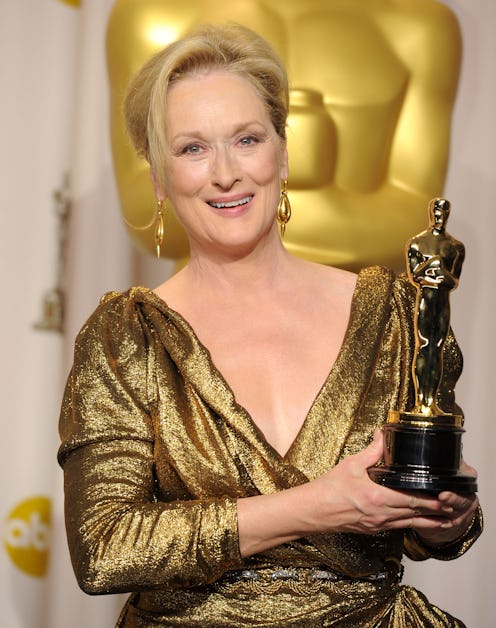Entertainment
"The Meryl Streep Defense" in Ageism Doesn't Work
Say you’ve got a point to make. A perspective that you struggle to uphold against detractors far and wide. One that you find yourself defending against discredit year after year after year. Here’s a little tip, and one that any lawyer, debate club student, or propagator of the scientific method might get behind: you’re probably going to want more than just one example to back up your argument. But those who deny the idea that the Hollywood industry is rife with ageism, particularly when it comes to women, haven’t really updated their go-to comeback since The Bridges of Madison County. You can’t just keep saying “What about Meryl Streep?” and think that you’re making a sound point.
By now, you’ve likely heard about the latest to fall back on Streep in the devaluation of the aging actress’ plight in modern day cinema: Russell Crowe, who cited the 64-year-old Streep’s flourishing career as failsafe evidence that women of any age have no problem landing gigs in showbiz — to recap briefly, Crowe said, “I think you'll find that the woman who is saying that [the roles have dried up] is the woman who at 40, 45, 48, still wants to play the ingénue, and can’t understand why she's not being cast as the 21 year old,” following up with the coup de grâce: “Meryl Streep will give you 10,000 examples and arguments as to why that's bulls**t, so will Helen Mirren, or whoever it happens to be.” What followed was the expected sum of backlash. But yielding to Crowe’s point now, somewhat unfortunately, is Streep herself.
During an Into the Woods panel, Streep approached the point of contention by presenting a more amenable view of the intentions behind her colleague’s comments than that which has been represented in the backlash thereto, pointing at the fact that he was using the line of “reasoning” to respond to a question about his own proclivity to take older roles these days in lieu of new Gladiator pictures, or the like. She capped her commentary by going so far as to say, “I agree with him. It’s good to live within the place that you are.”
While that final utterance might be the most damning, what she’s really referring to is Crowe’s assertion that one, on an individual level, shouldn’t try to eschew his or her age in crafting a personal or professional self-image. In earnest, what Streep seems to be doing here is padding the blow incurred by a respected colleague — one whose words of contention were lined with compliments to her, no less. But at no point in her notably evasive response to the issue is she really endorsing Crowe’s proclamation that older women have it easy in the movies business. Not even Meryl Streep, with as fruitful a career as one might imagine, can effectively bolster this mentality.
And the very fact that she is used time and time and time again as a representation thereof should be evidence enough that we’re short on women who’ve been given such opportunities. Crowe’s citations of Streep and Mirren are ones that we so frequently hear in defense of the Hollywood model. We’re told to “look at Meryl Streep” when we question availability within the industry of roles for women over 40 or 50. But to this, we should insist on looking beyond Streep.
Streep herself would be the last person to argue with this. She’s been an outspoken opponent of Hollywood’s discriminatory psychologies for years. What sprung about her is no more than an unfortunately matter of diplomacy: one professional’s inclination to defend the character of another professional, especially in light of the fact that the remarks that got him into trouble were made in reverence to her career. Although a preferable course of events would have seen Streep undercutting Crowe’s claims that everyone in the acting game has an equal leg to stand on, regardless of sex or age, we shouldn’t confuse occupational etiquette for ideological endorsement.
But more important than the issues of Crowe or Streep alone, no matter how condemnable or questionable their comments or responses may be, is the greater issue: we're still living in a time when the question of whether or not older women have a fair shake one of the biggest industries on Earth can rile such conflict. That alone should say something.
Images: Getty (2)
